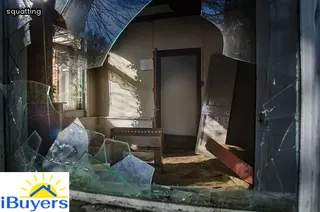Squatters are individuals or groups of people who take possession of a piece of property without the permission of the owner and without any legal right to do so. Typically, the squatters have no legal lease or rental agreement with the owner and may not even be aware that they are trespassing on private property.
In Wisconsin, squatters can gain certain rights after occupying a piece of property for a certain period of time. Homeowners should be aware of these rights as they could lead to complications when attempting to regain ownership over their real estate.
Squatters' rights can affect homeowners in a number of ways including limiting an owner's ability to sell their property, interfering with the collection of rent, and preventing repairs or renovations from taking place. It is important for homeowners to understand their rights in order to protect themselves against potential squatter claims and maintain control over their properties.

Squatting in Wisconsin is not as widely known as in other states, but it is still a legal practice. In certain circumstances, squatters may be able to establish legal rights to the property they are occupying if certain conditions are met.
Generally speaking, a squatter must occupy and maintain the property for a period of time and demonstrate an intent to own it before acquiring any legal rights. Furthermore, the residence must have been abandoned by the previous owner for at least one year with no contact being made between the two parties during that time.
If these conditions have been met, the squatting party may be able to acquire title to the property through adverse possession in Wisconsin. However, squatting without meeting these conditions is usually illegal and can lead to eviction or even criminal penalties.
It is also important to keep in mind that different localities may have additional rules and regulations regarding squatting so it is important to check with local authorities before attempting to claim ownership of an abandoned property.
Adverse possession laws in Wisconsin provide protections for squatters in certain circumstances. To begin with, the squatter must continuously occupy the property for a minimum of 20 years before they can make a claim of ownership through adverse possession.
They must also pay all applicable taxes and be the only person occupying the property during this time. In addition, the squatter must show that their occupation is open and visible, meaning that it is not hidden or done in secret.
Furthermore, they must prove that they are using the land as if it is their own. This includes establishing improvements such as fences or buildings and actively maintaining them.
Lastly, the squatter must demonstrate that they have acted in good faith by paying any relevant taxes and considering any prior claims from other parties. Understanding these rules is essential for anyone who wishes to use adverse possession laws to gain legal rights to a piece of real estate in Wisconsin.

Understanding color of title claims is an important part of understanding squatters' rights in Wisconsin. It is important to understand that a squatter may acquire rights to the property if they have been in possession for a certain period of time, even if they do not own the property.
When it comes to color of title claims, a squatter can acquire property rights if they have been in possession of the land for at least fifteen years and can prove that they acted in good faith when taking possession. In order for a squatter to be successful, it is important for them to show that they have made improvements to the property and paid any taxes associated with the land.
This is known as "color of title." Squatters must also prove that their occupancy was exclusive and peaceful.
A court will consider all these factors when deciding whether or not a squatter has acquired valid rights to the property under color of title laws.
Homeowners in Wisconsin should take proactive steps to protect themselves from squatters. One of the best ways to protect a property from squatters is to ensure that it is properly secured.
This could include installing locks, adding lighting and cameras, or even posting No Trespassing signs. Additionally, homeowners can also register their property with local law enforcement, as this can help them be aware of any potential squatter activity in the area.
Homeowners can also consult with a real estate attorney who is familiar with squatter laws in Wisconsin to understand their rights and responsibilities as well as what they can do if they become aware of a squatter on their property. As another precaution, homeowners may want to regularly inspect their property for any signs of occupation by squatters.
By taking these proactive steps, homeowners can reduce the chances of having a squatter occupy their home without permission.

Finding home and auto insurance in Wisconsin can be a complicated task for squatters, as policies typically exclude coverage for those who don't own the property they live on. However, there are a few options available to them.
Squatters may be able to purchase home and auto insurance from non-standard insurers, who offer policies that other companies may not provide. Additionally, they may be able to find insurance companies that specialize in providing coverage to squatters.
It is important to make sure that you read the policy carefully before signing up, as some policies might not cover liability or claims related to injury or damage caused by occupants of the property. There are also resources available for squatters in Wisconsin through state organizations such as the WI Squatters Association which can help with understanding their rights and finding appropriate insurance coverage.
Moving to Orlando can be an exciting and daunting experience. You may have heard about the city's vibrant arts and culture scene, its exciting nightlife, and its famously beautiful weather.
But before you make the move, it's important to understand some of the intricacies of living in the area, especially when it comes to squatters' rights in Wisconsin. Squatters' rights are laws that protect people from being evicted from a property without proper due process.
It's important to be aware of these laws because they can affect your ability to purchase or rent a home in Orlando. Knowing about squatters' rights also helps you protect yourself from any potential legal issues that may arise.
In this ultimate guide to moving to Orlando, we'll provide a comprehensive overview of squatters' rights in Wisconsin so you can feel confident in your decision to relocate.

St Louis County property tax can be one of the most confusing things to understand as a real-estate owner in Wisconsin. Property taxes are collected by local governments and are used to fund schools, roads, public safety services and more.
To ensure that all real estate owners in St Louis County pay their fair share of taxes, the county assesses each parcel of land based on its value. Property values are determined by market trends, including home prices, rental rates and construction costs.
This information is then used to calculate an estimated tax amount that owners must pay annually. It’s important to note that owners can appeal their assessments if they believe the value is too high or incorrect.
Understanding how property taxes work in St Louis County can help real estate buyers make well-informed decisions when purchasing a property and potentially save them money in the long run.
Wisconsin is a great place to call home, and if you’re a new resident it pays to know some of the basics. Wisconsin is known for its beautiful landscape, but it also has very specific rules and regulations when it comes to squatters' rights.
For those unfamiliar with the concept, a squatter is someone who occupies property without the owner's permission or legal title of ownership. In Wisconsin, squatters' rights may be established through adverse possession if certain criteria are met.
A squatter must occupy the property for at least 15 years in an open, notorious, and hostile manner. The squatter must also pay any applicable taxes on the property as well as make actual improvements to the land.
Additionally, squatters' rights do not apply in cases where a criminal act was used to gain possession of said property. Understanding these basic facts about squatters' rights in Wisconsin can help new residents navigate real estate transactions with more confidence.

Adverse Possession is a concept that has long been recognized in Wisconsin real estate law. Understanding the laws surrounding adverse possession and how it applies to your property can help you protect your rights as a property owner or tenant.
In Wisconsin, adverse possession is governed by Chapter 893 of the Wisconsin Statutes, which outlines the conditions under which a squatter may gain title to another’s property. To qualify for adverse possession in Wisconsin, the squatter must have continuously occupied the land for at least 20 years and must have done so openly and notoriously—meaning that their occupancy was visible and obvious to other people.
The squatter must also have paid all applicable taxes on the land during their period of occupancy, and they must not have acquired their rights illegally or through force or fraud. Additionally, they must intend to use the land as if it were their own, meaning they must be using it exclusively for themselves rather than renting it out or otherwise allowing others to use it.
If all of these conditions are met, then a court may grant title of the land to the squatter after a period of 20 years.
In Wisconsin, when it comes to understanding a squatter's rights in real estate, the term "color of title" is an important concept to understand. Color of title refers to a situation where a person takes possession of property through some type of good faith claim and then holds it for a period of time long enough that they would have legal ownership if their claim was valid.
In other words, color of title means that someone has taken possession of the property with the belief that they own it, even though they may not actually own it. In Wisconsin, if a squatter meets certain requirements and has acted in good faith for a period of seven years or more, then their color of title is considered valid and they can establish legal ownership.
It is important to note that certain conditions must be met in order for this seven year rule to apply and these conditions vary depending on the circumstances surrounding the property.

Squatting is a controversial issue in Wisconsin and across the United States. It can be a complicated topic to navigate, especially when it comes to issues such as property taxes.
In Wisconsin, squatters have rights that must be taken into consideration when addressing the issue of property taxes. Generally, squatters are not required to pay property taxes on the land or residence they occupy; however, there are certain circumstances that may require squatter’s to pay taxes on the land or residence they occupy.
This includes if the squatter has been granted permission by a court of law to occupy the dwelling, or if an agreement has been made between the squatter and the rightful owner of the property. If this is not the case and no agreement has been reached with regard to payment of taxes, then usually squatters are not obligated to pay them.
That being said, it is important for those considering squatting in Wisconsin to understand all applicable laws pertaining to squatting and taxation before entering into an arrangement with an owner or taking up occupancy in a dwelling.
Wisconsin has a unique set of laws when it comes to understanding and dealing with squatters. The state recognizes the rights of people who live in properties without permission from the legal owner, but they also provide options for getting rid of them.
One way is to serve an eviction notice, which requires that the squatters vacate the property within five days. If they fail to do so, then law enforcement can be called upon to remove them.
Additionally, landlords can work with their local police department, who may be able to help mediate a situation or even file criminal charges against squatters. Another strategy is to file an action in court, which allows a judge to determine whether or not the person is legally occupying the property and if they should be removed.
Finally, landlords may want to consider taking steps to secure their property better by changing locks and installing security devices so that squatters cannot enter in the first place. No matter what course of action you choose, it’s important to understand your rights as a landlord and work through any issues with squatters in Wisconsin as quickly as possible.

When it comes to preventing problems with squatters in Wisconsin, a few key tips can help real estate owners protect their property. First, research the laws in Wisconsin and be sure to understand the rights of squatters.
Knowing what is legally allowed and what is not allows owners to be aware of any potential issues. Secondly, make sure the property is well-maintained, and keep up with any repairs or maintenance needed.
This will help reduce the likelihood of someone taking over an abandoned or neglected property. Additionally, post appropriate no trespassing signs around the perimeter of the property and have them visible at all times.
Finally, if a squatter moves onto a property without permission, act quickly by filing an eviction notice with local law enforcement. Taking prompt action can often prevent a squatter from becoming more entrenched on the premises and cause less disruption for all parties involved.
Squatting is a unique real estate issue that is not always easy to understand, especially in the state of Wisconsin. By comparing the squatters' rights across nearby states, property owners can be better informed of their rights and obligations when dealing with these situations.
In Minnesota, squatters will acquire legal title to a property if they occupy and improve it for 15 years without interruption or dispute from the owner. Iowa's laws are similar to those of Minnesota; however, squatter's rights must be established through a court order after proving occupation and improvements for 10 years.
Michigan has some of the most restrictive laws concerning squatters' rights; in this state they are non-existent due to an ancient law called "adverse possession," which was abolished in 1981. While Illinois does allow squatters' rights, there are certain conditions that must be met before these claims can be established.
Squatters must take possession of land openly, continuously and peacefully for 20 years before they may gain legal title to the property. It is important for Wisconsin property owners to keep these other state laws in mind when managing real estate issues related to squatting as they may be more lenient than their own local laws.

Squatting, or the act of occupying a property without the legal right to do so, is a complex issue in Wisconsin. Investigating the legality of squatter’s rights requires an understanding of state law and how it applies to individual cases.
Before taking action as a property owner, it is important to consider how local statutes may affect your situation and whether pursuing legal remedies is necessary. Wisconsin has specific legislation that can provide some protection for squatters who have resided on a property for an extended period of time, though there are limits as to what rights they can claim.
In addition, public policy dictates that certain procedures must be followed when attempting to remove someone from a property. Understanding these laws and regulations can help both property owners and squatters resolve their disputes in an equitable manner.
When it comes to dealing with a squatter situation, the impact on property values is an important consideration. In Wisconsin, understanding the legal rights of squatters is essential in order to protect the value of real estate investments.
Knowing what actions can be taken to remove a squatter from a property, and how this will affect the value of a property, are both important elements when evaluating whether or not to invest in a particular piece of land. Squatters' rights can vary depending on local laws, so it's important for investors to research these laws in order to determine which steps must be taken.
It's also beneficial for investors to consider the potential effects that may result from having a squatter on their property before making any decisions about their investments. Taking all these factors into account can help ensure that investors make informed decisions that keep their real estate investments secure and valuable.

When it comes to understanding squatter’s rights in Wisconsin, potential legal action should be considered when a homeowner is faced with an unwanted squatter. It is important to know that each situation will be different and Legal Aid of Wisconsin can provide an assessment of the potential legal action that can be taken.
In some cases, it may involve filing a forcible detainer lawsuit or seeking assistance from local law enforcement. However, before any action is taken, it is essential to understand the laws regarding squatters’ rights in Wisconsin and be sure that the desired outcome is within legal limits.
In addition, there are certain steps a homeowner can take to protect their property from becoming a target for squatters such as posting no trespassing signs, locking all doors and windows when away from home, or installing an alarm system for added security. Understanding these laws and taking precautionary measures can help prevent any potential legal issues from arising with an unwanted squatter in the future.
When dealing with a squatter problem, investigating insurance solutions is an important step. It is essential for Wisconsin real estate owners to understand their rights when it comes to squatters, as well as the potential options available through insurance.
Homeowner’s insurance policies may provide coverage in some cases, however, it is important to contact your insurance provider directly to find out if they offer coverage and what the details of that policy are. In addition, landlords should be aware of crime victim’s compensation funds in Wisconsin which can help cover expenses such as legal fees related to evicting a squatter from their property.
While these resources can help protect you from financial liability due to squatters, understanding your legal rights and responsibilities is essential for any real estate owner in Wisconsin.

When facing a squatter situation in Wisconsin, it is important to analyze all of the potential options available. Squatters' rights in Wisconsin are governed by both state and federal law, so it is crucial to understand the nuances of both when addressing an issue with a squatter on your property.
Additionally, even if the squatter does not have legal rights to the land, there may be other solutions rather than taking them to court. There are a variety of strategies that can be employed depending on the individual's circumstances, such as negotiating rent payments or offering free services in exchange for them leaving voluntarily.
It is also important for property owners to know their obligations under state and federal law when dealing with squatters; certain actions may unintentionally grant them certain rights which could complicate matters further. Understanding all of these elements of squatting in Wisconsin can help ensure that property owners are well-prepared should they ever find themselves faced with this difficult situation.
In Wisconsin, squatters rights, also known as adverse possession, is a process where an individual obtains legal title to another person’s real estate property by occupying it for a certain period of time. The shortest time for squatters rights in Wisconsin is 20 years.
This requires the squatter to occupy the property continuously for at least 20 years and have paid all taxes due on the property during that time. In addition, they must also have made improvements or repairs to the property and had exclusive possession of it.
During this time, they must not have been paying rent and must not have had permission from the owner. If all these conditions are met, then after 20 years they can establish legal title to the real estate property in Wisconsin.

Yes, Wisconsin does have adverse possession laws. Adverse possession is a legal doctrine that allows an individual to take ownership of another person's real estate property if certain requirements are met.
In Wisconsin, this means that a squatter can obtain title to another person's land by occupying it for at least 20 years and meeting other requirements specified by the state. The individual must also demonstrate continuous possession of the property and pay the taxes on it during that period of time.
Furthermore, they must prove that their occupancy was hostile to the former owner's rights and exclusive in nature. If all of these conditions are satisfied, then the squatter may be able to acquire title to the land through adverse possession.
Are squatters rights OK? In Wisconsin, the answer is a resounding yes. Squatters' rights, also known as adverse possession, allow people to obtain title to real estate without paying for it.
As long as certain requirements are met, squatters in Wisconsin can gain legal ownership of a property after living on the land for a specific period of time. To understand if and how this applies to your situation, it's important to familiarize yourself with the rules and regulations in the state.
The statutes governing squatters' rights in Wisconsin may differ from those in other states, so it's important to consult an attorney or legal adviser with expertise in real estate law before taking action. With proper guidance and information, you can make sure that your real estate goals are reached while adhering to all applicable laws.
Squatters' rights in Minnesota are determined by the state's adverse possession laws. According to these laws, someone who has been living on and using another person's property for a certain period of time can be considered a legal owner of the land.
This is known as adverse possession, or squatting. In order to claim adverse possession in Minnesota, an individual must be able to prove that they have been occupying the land for at least 15 years and that they have been paying all applicable taxes on the property during that time.
Additionally, they must demonstrate that their use of the land has been continuous and open enough to inform any reasonable person that it is being used without permission from the true owner. If all these requirements are met, then an individual may be able to establish ownership through adverse possession rights in Minnesota.
A: In order for an individual to establish open and notorious squatters' rights in Wis., they must occupy the real property and make a substantial improvement to it, along with filing affidavits with the county register of deeds.
A: A Tenant at Will is an individual who occupies a rental property without a written lease agreement. This type of tenancy may be established through open and notorious possession, allowing the tenant to acquire squatters' rights in Wisconsin.

A: In order to establish open and notorious squatters' rights in Wisconsin, month-to-month renters must pay rent to the owner of the property or use the property with the permission of the owner for a continuous period of at least six months. This creates a legal status known as "Tenant at Will", which grants certain protections to the renter.
A: In order to establish open and notorious squatters' rights in Wisconsin, the tenant must occupy the property for at least ten consecutive years and pay all taxes due on the property. As a statutory trespasser, their status is that of a Tenant at Will and they are not considered to have any legal right to possess the premises.
A: The Sheriff is responsible for enforcing eviction orders issued by the court. If a squatter is staying on a property without the owner's permission, the Sheriff may be called upon to remove them.
A: A Prescriptive Easement is when an individual has occupied a landowner's property for a certain amount of time, usually 20 years, without the owner's permission. If this has been done openly, notoriously and continuously, then the occupant may have the right to continue using that property even if they do not own it. However, squatting on someone else's property is still considered illegal activity in Wisconsin and any rights acquired are limited by the state.
A: Yes, squatting is considered a criminal offense in Wisconsin.
A: To establish open and notorious squatters' rights in Wisconsin, an individual must occupy a property without the consent of the owner for at least 10 years and pay all taxes on the property. The individual must also record a claim with the proper Register of Deeds Office in the county where the property is located.
A: In Wisconsin, an individual must prove their claim to squatters' rights by a preponderance of the evidence. This means that it must be more likely than not that the individual has been occupying the property openly and notoriously for a continuous period of at least 20 years under U.S. law.
A: In Wisconsin, a real estate investor must take continuous possession of the property for at least 20 years, maintain exclusive control over the property, pay all taxes on the property, and notify the owner of their claim to the land by certified mail.
A: In order to establish open and notorious squatters' rights in Wisconsin, an individual must have possession of the land for a period of at least 20 years. This is known as a Prescriptive Easement, which is a legal standard of proof that establishes an individual's interest in the property.
A: To establish squatter's rights in Utah, an individual must occupy the property openly and notoriously for seven years. The tenant must also pay all applicable taxes for the property and demonstrate that they have made significant improvements to it during their occupancy.
A: In order to establish open and notorious squatters' rights in Wisconsin, a squatter must occupy the property openly, continuously, exclusively, and under a claim of right for at least 20 years. The squatter must also have acted as if they were the owner of the property. If the squatter is from out of state (e.g. New York City) and does not have any receipts or proof of payment, they will still be able to establish their rights under Wisconsin Property Law.
A: In order to establish open and notorious squatters' rights in Wisconsin, an individual must continuously occupy the property and pay taxes on it for at least 20 years. A tenant must also prove possession of the property was open, notorious and hostile to the true owner. This is known as a Prescriptive Easement.
A: In order to establish open and notorious squatters' rights in Wisconsin, an individual must have knowledge of the tract of land, which can be obtained through the Internet, estate taxes, or other public records.
A: In order to establish open and notorious squatters' rights in Hampshire, Wisconsin, the individual must have occupied the land continuously for 15 years or more without interruption or objection from the true owner. Additionally, they must have made a substantial improvement to the land and paid all taxes associated with it during that time.
A: Individuals with disabilities in Wisconsin may be able to establish squatters' rights by using a Prescriptive Easement. This type of easement allows a person to legally occupy the land if they have been doing so openly and notoriously for a period of time without objection from the rightful owner. To successfully establish such an easement, an individual would need to provide evidence that they have continuously occupied the property for at least 20 years and that their occupancy has not been interrupted or denied by the rightful owner.
A: A constable can provide an affidavit to testify that the individual has held possession of the property for an extended period of time, usually more than six years. The affidavit must include specific details such as when the individual began occupying the property, how long they have been residing there, and whether any payments have been made to the owner of record. The affidavit must also state that the individual has maintained open and notorious possession for this entire time period and has not had any contact with the owner of record from Connecticut or anywhere else during this time. Finally, it must also state that all other tenants on the property have been aware of this occupation through a clock or other means.